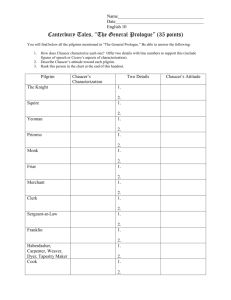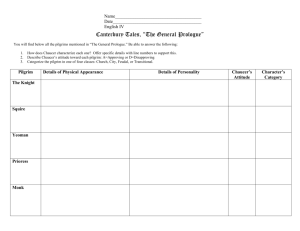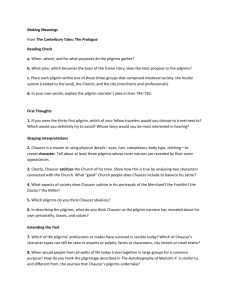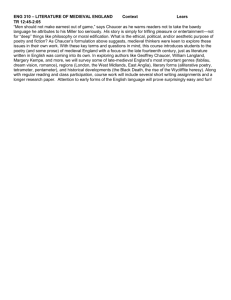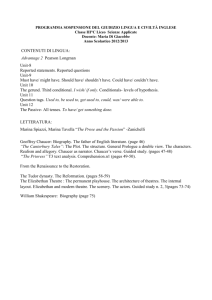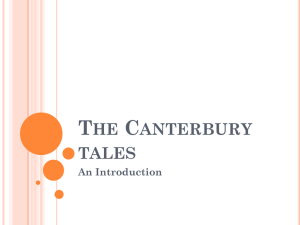Midterm review
advertisement
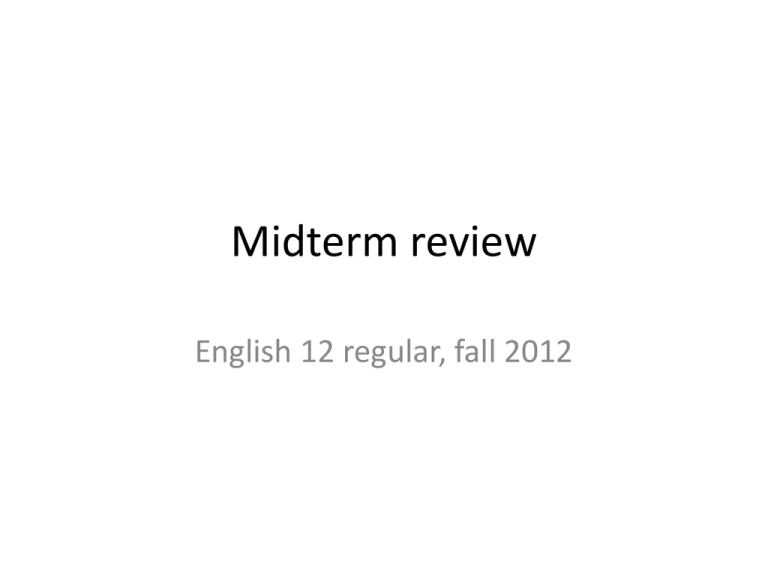
Midterm review English 12 regular, fall 2012 • Some of these slides are repetitive. Some of them ask the same question but in slightly different ways. Don’t be concerned about that—just be grateful to have this review. • Not all of these questions are on the test. However, if you study this review, you will be well prepared for the midterm. This king united England by encouraging the use of Old English as a common language Alfred the Great • This ended Anglo-Saxon rule of England in 1066 • Norman Conquest • The signing of this limited the power of the English king and gave more power to the barons • Magna Carta This is an Anglo-Saxon word meaning “manprice,” or the price a tribe must pay for murdering a warrior from another tribe Wergild • this is the rigid social system that governed England in the early medieval era • Feudalism This conflict helped England develop a sense of national identity Hundred Years War • In these places, written texts were copied and preserved during the Anglo-Saxon and Medieval eras • Monasteries • This is the Anglo-Saxon word for “fate” • Wyrd • This is the Anglo-Saxon word for a travelling storyteller • Scop This is the word describing a group composed of a warlord and his followers Comitatus This was the vernacular language in Anglo-Saxon England Old English • Chaucer writes about this kind of trip in The Canterbury Tales • Pilgrimage • This is the language of the church and known by the educated elite in Anglo-Saxon and medieval England • Latin • This is the language spoken by the ruling class in medieval England • French • This is the vernacular language in medieval England • Middle English • The one hundred most commonly used words in Modern English come from this language • Old English This is a long poem telling the deeds of a hero Epic • This is a man who does great deeds and represents the values of his people and culture • Epic hero • A word or phrase used to characterize a particular person, place, or thing • Epithet • A phrase used in Anglo-Saxon poetry to describe a person, place, or thing • Kenning • This is a literary device which seems to be contradictory but is actually true in the context of the work of literature. • Paradox • This is a literary device directly comparing two unlike things • metaphor • The manuscript for Beowulf was probably written in one of these places • monasteries This author was born into a middle class family but worked as a page in an upper class household, thus allowing him to know about both social classes. Geoffrey Chaucer • This is the plot structure used for The Canterbury Tales and The Decameron. • Frame narrative/story • This is the language commonly spoken every day by a large group of people • Vernacular • This Italian work is an important source for Chaucer’s Canterbury Tales • The Decameron • This type of story became the most popular work of literature in medieval England. • Romance This is the code of behavior for knights in medieval England Chivalry • This word means “entertainment value” in Middle English • “solace” • This word means “lesson or moral” in Middle English • “sentence” Chaucer’s pilgrims This pilgrim is on the pilgrimage to Canterbury specifically to give thanks to God. Knight Chaucer’s pilgrims This pilgrim works with pharmacists to maximize their profits. Doctor Chaucer’s pilgrims This religious pilgrim has the gift of gab and loves to spend time with the wealthy people in town, hearing their confessions for a fee. Friar Chaucer’s pilgrims • This pilgrim has beautiful manners and cares very much about animal welfare. • Nun • This is a journey that is meant to show religious devotion. • Pilgrimage Chaucer’s pilgrims • This pilgrim loves to travel and knows the “remedies” for the pains of love. Wife of Bath Chaucer’s pilgrims • This man is one of Chaucer’s perfect pilgrims and spends much time traveling around his community, visiting people. • Parson Chaucer’s pilgrims • This pilgrim rides at the very end of the group so that he can watch everybody else. • Reeve Chaucer’s pilgrims • This pilgrim accepts bribes from sinners and allows them to continue sinning. • Summoner Chaucer’s pilgrims This pilgrim deceives people with false relics. Pardoner • Beowulf is an example of this kind of literary character • Epic hero • This is the language spoken by William the Conqueror and his nobles • French Chaucer’s pilgrims • This pilgrim carries a pillow case said to be a piece of the Virgin Mary’s veil; sings an offertory very well • Pardoner Chaucer’s pilgrims • This pilgrim has terrible sores on the face and loves to eat garlic and onions; only speaks Latin when drunk • Summoner Chaucer’s pilgrims • This pilgrim can sweet talk a poor widow out of her last farthing, but prefers hanging out with the rich people • Friar • “My mind is full of scorpions” is an example of this literary device • metaphor • “Fair is foul, foul is fair” is an example of this literary device • paradox • Chaucer wrote in this language • Middle English • In this story, young, wealthy Italians travel the countryside to escape an outbreak of the plague. • The Decameron • “the Almighty’s enemy,” “that shadow of death,” “shepherd of evil,” and “guardian of crime” are all examples from Beowulf of this Anglo-Saxon literary device. • kenning • this document, signed in 1215, became the basis for English constitutional government • Magna Carta • his rule began in 871, and he united the Saxon tribes of southern England and led them to victory against the Danes • Alfred the Great • invasion of England that occurred in 1066 • Norman Conquest • This social system had the king at the top and serfs at the bottom, with land-owning nobles in the middle • feudalism • The Canterbury Tales was written in this language • Middle English • language that the Beowulf manuscript is written in • Old English • plot structure that creates a story within a story • Frame narrative True or false? • Beowulf becomes king of the Danes. • false True or false? • Hrothgar sends for Beowulf to help him defeat Grendel. • false True or false? • Beowulf’s first important battle is with the dragon. • false True or false? • Beowulf’s warriors all display great bravery in the fight with the dragon. • false True or False? • Beowulf is king of the Geats. • true True or false? • Beowulf says Wiglaf should be king after him. • True • wrote an important Italian work that influenced Chaucer • Giovanni Boccaccio Chaucer’s pilgrims • has been to Jerusalem three times; is “skilled in wandering by the way” and wears nice clothing • Wife of Bath Chaucer’s pilgrims • “Children were afraid when he appeared.” • Summoner Chaucer’s pilgrims • practices what he preaches • Parson Chaucer’s pilgrims • his skinny appearance is an indicated that he is tight-fisted with money and secretive in his dealings with people • Reeve Chaucer’s pilgrims • has relationships with women, then finds them husbands and pays the women to keep it secret • Friar Chaucer’s pilgrims • embezzles from his boss and is secretly wealthy • Reeve • his writing helped give legitimacy and significance to Middle English • Chaucer Renaissance poetry and literary devices • This is a humorous imitation of a literary work that aims to point out the work’s shortcomings. • parody Renaissance poetry and literary devices • a ____ is defined as a statement or situation that seems impossible or contradictory but is actually true, either literally or figuratively, in the context of the work of literature. • paradox Renaissance poetry and literary devices • In sonnet 30, when the speaker compares his love to ice, this literary device is used: • simile Renaissance poetry and literary devices • Which poem has this main idea: Love is so powerful that it can alter the laws of nature. • Sonnet 30, “My love is like to ice” Renaissance poetry and literary devices • Which poem has this main idea: Death is not something to be feared. • Sonnet 10, “Death be not proud” Renaissance poetry and literary devices • a ____ is defined as a comparison using like or as • simile Renaissance poetry and literary devices • Which sonnet contains two paradoxes that extend throughout the poem? • Sonnet 30, “My love is like to ice” Renaissance poetry and literary devices • Which sonnet describes a woman very realistically? • Sonnet 130, “My mistress’ eyes” Renaissance poetry and literary devices • Which Italian writer made the sonnet famous? • Petrarch Renaissance poetry and literary devices • ____ is defined as a figure of speech in which a speaker talks to an inanimate object, idea, or absent person. • apostrophe Which character from Twelfth Night is described? • discovers that disguise is a “wickedness” but decides not to try to “untie” the “knot” created by the disguise • Viola Which character from Twelfth Night is described? • says about himself, “Well, I’ll put it on, and I will dissemble myself in ‘t, and I would I were the first that ever dissembled in such a gown.” (Act 4, scene 2, lines 4-6) • Fool Which character from Twelfth Night is described? • marries Sebastian • Olivia Which character from Twelfth Night is described? • is convinced by Toby that he will eventually win the favor and grace of Olivia • Andrew Which character from Twelfth Night is described? • is convinced by a letter that he has already won the favor and grace of Olivia • Malvolio Which character from Twelfth Night is described? • Dresses as a priest in Act 4 • Fool Which character from Twelfth Night is described? • rescues Viola from a duel • Antonio Which character from Twelfth Night is described? • marries Maria • Toby Which character from Twelfth Night is described? • says that “such as I am, all true lovers are, unstaid and skittish in all motions else save in the constant image of the creature that is beloved” (Act 2, scene 4) • Orsino Which character from Twelfth Night is described? • who is “the lady” described in Act 4 scene 3: “…or else the lady’s mad. Yet if ‘twere so, she could not sway her house, command her followers…” • Olivia Which character from Twelfth Night is described? • “the devil a puritan that he is, or anything constantly but a time-pleaser; an affectioned ass…so crammed, as he thinks, with excellencies, that it is his grounds of faith that all that look on him love him” (Act 2, scene 3) • Malvolio • • King who united Anglo-Saxon tribes, led them against invaders, and promoted use of AngloSaxon language • Alfred the Great • Anglo-Saxon word for fate, a controlling force that could not be overcome • wyrd • Anglo-Saxon word for entertainer who performed songs of heroes • scop • this is defined as a literary character who embodies the values of his culture • Epic hero • Price paid to a tribe as reparation for killing one of its warriors • wergild • Anglo-Saxon literary device; descriptive phrase • kenning • Group composed of a warlord and his followers • comitatus • ____________ is the rigid social system or structure that governed England in the early medieval era. • feudalism • ________ is a system of ideals and codes of behavior that governed knights and gentlewomen. • chivalry • _______ is an important Italian source for The Canterbury Tales. • The Decameron • Geoffrey Chaucer was born into a _______class family. • middle • The ______ limited the king’s power and became the basis for English constitutional law. • Magna Carta • The one hundred most commonly used words in Modern English come from this language: • Old English • ________ brought about the first feelings of national identity in England. • Hundred Years War • In the Middle Ages the upper class in England spoke ________ • French • The vernacular language in England in the Middle Ages was __________ • Middle English • The entertainment value of Chaucer’s stories was called (in Middle English) ____ • solace • The lesson taught by Chaucer’s stories was called (in Middle English) _____ • sentence • Chaucer used this literary device to write the Canterbury Tales: • Frame narrative/story Chaucer’s pilgrims • practices what he preaches; is a good shepherd and puts other people first • Parson Chaucer’s pilgrims • has married off many young women and paid them money to keep quiet; can talk a poor widow out of her last penny • Friar Chaucer’s pilgrims • knows remedies for the pains of love; is skilled at making cloth; loves to travel and has been to Jerusalem three times • Wife of Bath Chaucer’s pilgrims • carries a pillow case (and other false relics) said to be a piece of the Virgin Mary’s veil; sings an offertory very well • Pardoner Chaucer’s pilgrims • follows “chivalry, truth, honor, generousness, and courtesy” and has “never said a boorish thing” in his life • Knight Chaucer’s pilgrims • has beautiful manners and loves her dogs; works hard to “counterfeit a courtly kind of grace” • Nun Chaucer’s pilgrims • has terrible sores on the face and loves to eat garlic and onions; speaks Latin when drunk; values power over people • Summoner Chaucer’s pilgrims • he rode at the very end of the group of pilgrims, probably so that he can keep an eye on everyone • Reeve
